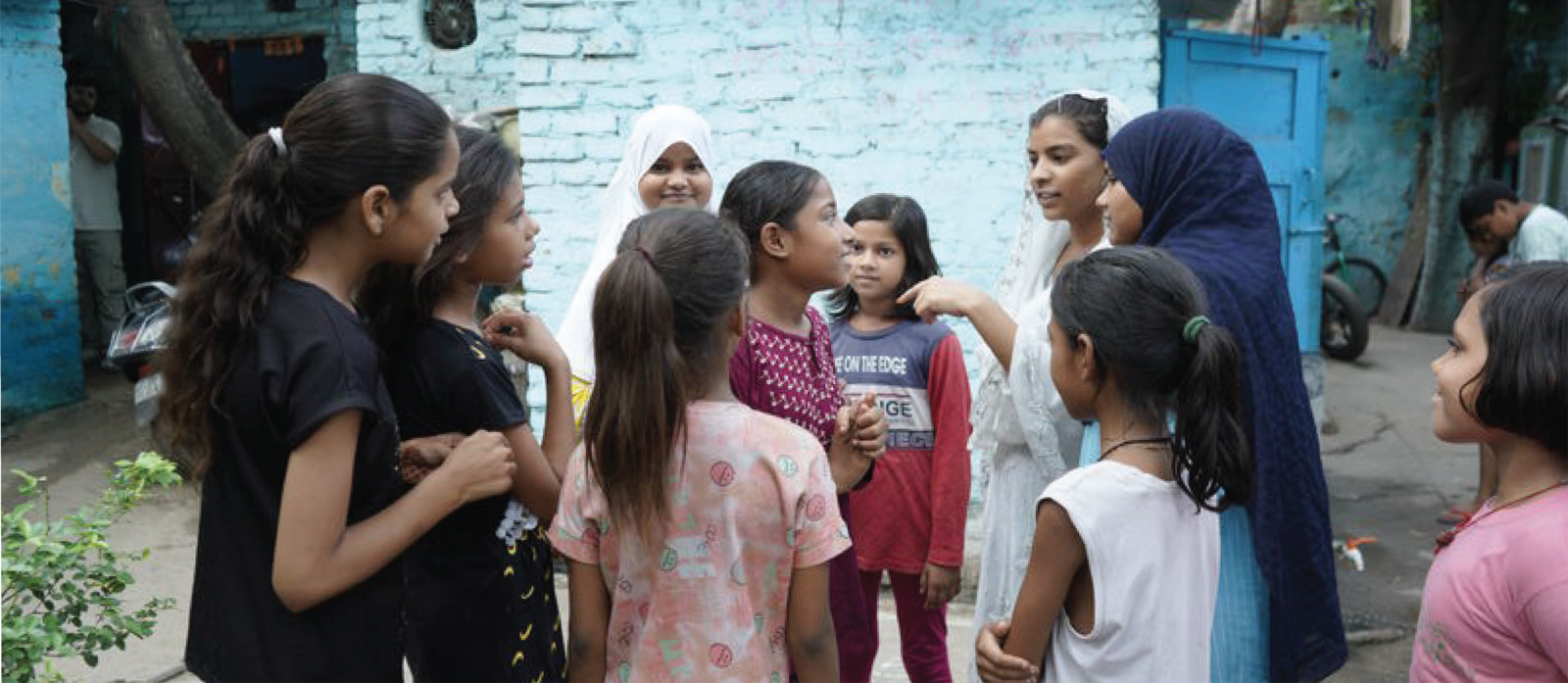At 17, Zoya* had already faced more than most do in a lifetime. After her father’s sudden demise, when the burden of running a household of three fell entirely on her mother, Zoya’s education was the first casualty. Just when it seemed like her future was slipping out of reach, Railway Children India stepped in. To begin with, our team helped her secure her school fees for the year through Mission Vatsalya’s Preventive Sponsorship Program.
Then came a pivotal leadership role as a Peer Leader of Tulsi Nagar.
This opportunity brought her an array of essential life skills, like critical thinking, creative problem-solving, effective communication, and informed decision-making, through a comprehensive Life Skills Training Program. She took the lessons she learned back to her community, where she trained a group of her peers in these life-changing skills.
Like Zoya, Railway Children India has fostered the growth of 50 Peer Leaders across 6 communities. Alongside them are five remarkable young changemakers from across the globe who are harnessing technology and creativity to tackle the climate crisis head‑on. Their pathbreaking journeys show what’s possible when young people take the lead, proving that meaningful change begins with bold action, no matter one’s age or where one starts.
1. Sahithi Radha – E-Waste Warrior & Global Climate Advocate
More than a climate activist, seventeen-year-old Sahithi Radha is a force of nature. Building on five years of grassroots work in South India, she’s led sanitation worker support programs, e-waste management drives, and authored climate reports. She founded E-Cycl, an e-waste recycling initiative, creating a circular economy model replicated nationally. A global voice for youth climate action, serving on international boards like Teach the Future and UN Women’s 30 for 2030, Sahithi also collaborated with the United Nations, delivered a TEDx Talk, and received accolades including Meta’s 25 Under 25, UNESCO’s International Young Voices, and Women of the Future’s Rising Star in ESG.
2. Madhvi Chittoor – The “No Plastic Ninja”
Thirteen-year-old Madhvi Chittoor is waging a war on plastic pollution. Dubbed the No Plastic Ninja, she has successfully pushed for policy changes, including the ban of styrofoam lunch trays across 155 schools and the passage of Colorado’s Plastic Pollution Reduction Act. She’s now campaigning to ban “forever chemicals” from everyday products, all while spreading awareness through her book Is Plastic My Food?
3. Cash Daniels – The “Conservation Kid”
At just 14, Cash Daniels has already made a big impact as a conservationist and a Time Magazine Kid of the Year finalist. Also known as The Conservation Kid, he has devoted himself to protecting rivers and marine life. Cash has removed an astounding 35,000 pounds of trash from the Tennessee River and its banks, improving water quality for more than 5 million people. Through clean-up drives, community education and advocacy, he proves that even small actions, like picking up a single piece of trash, can lead to large-scale environmental change. His efforts are documented in his book One Small Piece and through The Cleanup Kids, a youth-led non-profit he co-founded.
4.Kingsley Cheng – Innovating Waste Sorting with AI
When waste is incorrectly sorted, recycling bins often end up sending their entire contents to landfills. Thirteen-year-old Kingsley Cheng decided to tackle this problem head-on. He developed an AI-powered recycling bin that uses a camera to identify materials like plastic, glass, and paper before sorting them into the correct compartments. His design won at Preface’s 2024 Nomad Awards Tech Competition, and while still in the prototype phase, it holds immense potential to revolutionize waste management globally.
5.Amara Nwuneli – Transforming Waste into Playgrounds
Winner of the 2025 Earth Prize, Amara Nwuneli is turning trash into joy for her community. She transformed a waste dump into a vibrant playground made from recycled tires, complete with a garden, greenhouse, and waste collection center. Her work not only tackles environmental waste but also gives children a safe place to play and learn. Amara plans to replicate this model, building three more eco-parks in Nigeria to promote sustainability and community well-being.
From AI-driven waste solutions to transforming dumps into playgrounds, these young leaders are proving that innovation, persistence, and passion can redefine our relationship with the planet. More importantly, they prove that Peer Leadership and Peer Influence are key to sustainable change and development, whether it’s a small basti in Delhi or a coastal town along the Tennessee River.
*Name changed to protect the identity of the child.





